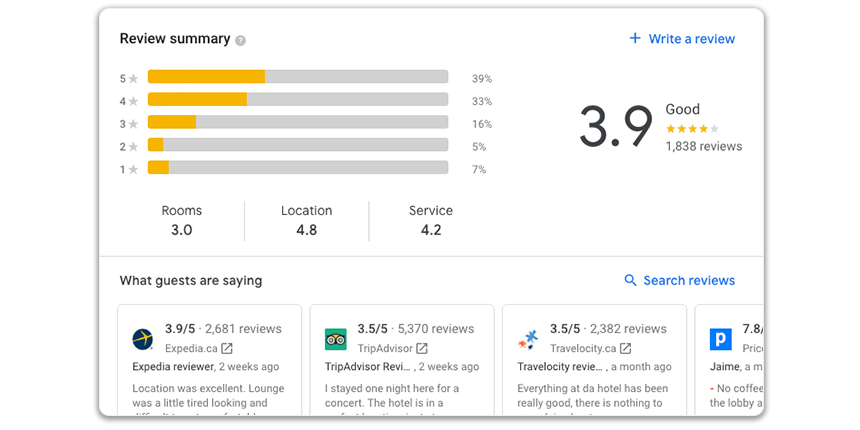
Maximize your local presence through strategic location management.

Hospitality is one of the most competitive industries thanks to an overly crowded market full of everything from high-end luxury hotels and resorts to small, economy motels and hostels. Add the growing popularity of platforms like AirBnB, and it’s clear that the way travelers are searching for and booking accommodations is changing.
Google and other search engines treat businesses in the hospitality industry a little differently including a number of features that are exclusive to travel accommodation listings. Considering 60% of leisure travelers use search engines for online trip planning, hotel marketing managers need to make sure their listings are content rich and informative. To get the most out of your listings, here are 5 things you need to know about GMB for hotels:
One feature unique to hotel listings is the check-in and check-out times. Google now supports displaying this information right on the hotel’s GMB business profile. With the prevalence of “near me” searches and spontaneous purchase decisions, hotels that have must-know information readily available on their listing rather than forcing the user to visit their website may be chosen simply for the convenience.
With that quick, easy booking mindset, Google has also started working with multiple hotel chains and online booking services, including Choice Hotels, AccorHotels and InterContinental Hotels Group, Priceline, Expedia, Mirai, and Travelclick to offer an instant booking option through mobile.
Airline check-ins (currently only available in the U.S.) will also be pushed out worldwide once hurdles related to language and technology adoption of Google Assistant voice tool are cleared.
Google presents a unique display for hotel search results. Date ranges, price ranges, selected amenities, and more can be filtered and the user has the ability to zoom in and out of the map display. This results page will also display photos (either provided by the hotel or user-submitted), information such as the neighborhood and locations, and reviews. With all of this additional information readily available, it’s very important for hotels to make sure every detail is covered.

Google knows users love a good price comparison. With “price insights”, a searcher can see prices for comparable hotels in the area during their date range. When looking at a hotel, Google may display a “this hotel costs more than similar hotels nearby” message. This prompt lets the user know they are looking into hotels that are listed above market price and makes it easy for them to keep exploring their options.

Google is working on making the hotel booking experience easier for users and in the process has added a number of things for hotel marketing managers to consider. For one, Google doesn’t allow for an appointment/booking URL on a business profile and instead includes a paid commission booking button. With 65% of hotel revenue typically coming from room bookings, this feature is having a direct and severe effect on income.
Another 25% of hotel revenue can often be attributed to built-in restaurant, bars, or special room service options all of which cannot be promoted via the hotel business profile. That means managers have to create a separate Google listing to compete with surrounding restaurants.
A few more features hotel managers have to do without include:
Subscribe to our monthly newsletter.
After buying the travel booking software company ITA, Google launched Google Flights in 2011. Google then launched Google Trips in 2016. Hotels being the next logical extension of these two websites now has Google launching Google Hotels in 2019.
Google Hotels offers all the same functionality of other hotel booking websites such as Booking.com, Expedia, and Kayak. However, Google has the added advantage of incorporating its own search results and GMB hotel profiles right into its service. Google Flights made an impact in its market and it seems likely that Google Hotels will make those same waves.

Having hotel information aggregated and curated by Google seems beneficial but there is a downside. With Google monopolizing data and keeping users on one of their domains for the entirety of their research and booking process, Google is able to leverage its position against the interests of the hotels themselves. Brands often bid on rival names and trademarks and with all hotels competing on the same Google searches, it is becoming very difficult to rank on organic searches such as “Hotels in Chicago”.
By removing the features that would naturally help hotels rank organically, Google is making paid rankings more necessary. While that may be a better experience for Google users, it’s more expensive for the hotels themselves.
The hospitality industry relies heavily on reviews and ratings from guests. Someone searching for accommodations will be interested in two types of ratings: the overall Google star rating (near the top left corner in the screenshot below), and the class ratings (underneath the review summary graph).

The overall rating is generated from in-house Google reviews. Reviews from third-parties such as TripAdvisor.com and Booking.com will be displayed as well but their rating isn’t factored into Google’s star rating (since not all websites follow a 5-star system).
Google gathers data for class ratings from a variety of sources including third-party partners, direct research, feedback from hoteliers, and machine learning inference that examines and evaluates hotel attributes. While the overall rating may be high because it takes into consideration guest expectations and how well the hotel delivered, class ratings are based on more than just user reviews. Specific class ratings can include:
It may seem like there isn’t much hotels can do when denied all the free features that other industries get. Your reviews are based on more factors than can be counted, but luckily there is one thing that appeases Google, boosts SEO, and is absolutely free: responding to reviews. In fact, responding to reviews has the power to increase your average rating by as much as half a star. That’s why responding to ALL reviews—both positive and negative—is essential.
Your responses will also lead to an uptick in the number of reviews you receive as those that see an actively responding owner will be enticed to leave their own feedback.
Responding to reviews can be a tall order. The more locations you open and the more websites you appear on, the harder it becomes to keep up. Pre-populated review responses are one solution but you also want your responses to be genuine and unique.
We’re experts at local and we know exactly how Google updates can affect your bottom line. Contact us to find out how we can help your business get—and stay—optimized in the challenging hospitality industry.
Maximize your local presence through strategic location management.
Maximize your local presence through strategic location management.
Subscribe to our monthly newsletter.